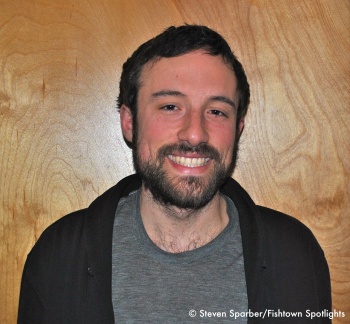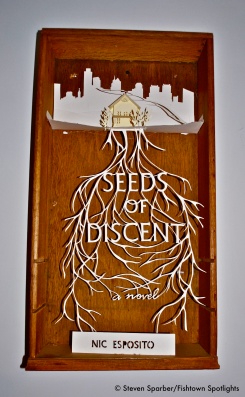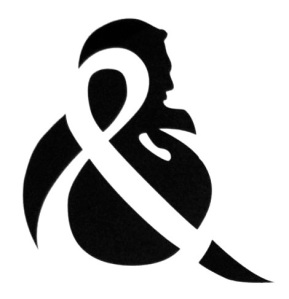 Writers can present profound insights through their work, but for some their ideas may not reach beyond the page. They flourish in the world of words but become unstable in the world of people. We all know the image of the troubled author seen in someone like Hemingway, or the poet Dylan Thomas. They may not be able to connect with those around them, but their understanding of the human heart allows for a connection to a reader they’ve never met. Through writing, they exhibit a spirit that doesn’t necessarily manifest in their actual lives.
Writers can present profound insights through their work, but for some their ideas may not reach beyond the page. They flourish in the world of words but become unstable in the world of people. We all know the image of the troubled author seen in someone like Hemingway, or the poet Dylan Thomas. They may not be able to connect with those around them, but their understanding of the human heart allows for a connection to a reader they’ve never met. Through writing, they exhibit a spirit that doesn’t necessarily manifest in their actual lives.
There are also writers whose lives are examples of their ideals. The writing of Philadelphia author, speaker, and publishing entrepreneur Nic Esposito, comes from a vision to improve the city in which he lives. His past volunteer work in various parts of the country, including Louisiana after Hurricane Katrina, created an appreciation for helping communities. These experiences have translated into writing that explores our city’s problems, and contemplates their solutions.
 Nic’s first novel, Seeds of Discent, depicts a group of urban farmers struggling with land acquisition, a well-known issue in Philadelphia. The author is himself a farmer, and runs Emerald Street Urban Farm along with his wife Elisa. Their garden is a growing outlet for community engagement. Neighbors are invited to take part in harvests, and can simply congregate and enjoy themselves. It’s one of many examples of Nic’s belief in a quality and healthy life, to which everyone deserves access.
Nic’s first novel, Seeds of Discent, depicts a group of urban farmers struggling with land acquisition, a well-known issue in Philadelphia. The author is himself a farmer, and runs Emerald Street Urban Farm along with his wife Elisa. Their garden is a growing outlet for community engagement. Neighbors are invited to take part in harvests, and can simply congregate and enjoy themselves. It’s one of many examples of Nic’s belief in a quality and healthy life, to which everyone deserves access.
What is one of the most important experiences in your life? After college I didn’t want to jump into the working world. Instead I joined AmeriCorp NCCC. This happened right after Hurricane Katrina, when the Bush administration was trying to reduce a lot of AmeriCorps programs. I was deployed to the gulf coast for seven months, where I worked on houses, became a school guidance counselor, and did different types of relief work. My team and I worked independent hours on tons of farms. I really got into the lifestyle of farm work and growing my own food.
What types of values did these experiences instill in you? AmeriCorps exposed me to the world of volunteerism. Once you see the power of this world, and the soul satisfaction it can give you, you can’t turn your back on it. I will always volunteer my time. Currently, my wife Elisa and I run Emerald Street Urban Farm. Elisa began the project, and it’s created a lifestyle of volunteering for both of us. Our lives are focused on growing food not only for ourselves, but for donation to soup kitchens. I’ve come to realize that farming is one of the most amazing professions. There’s so much you can grow just by utilizing the earth. You can find a plant, save some seeds, plant them again, and grow more. Farming isn’t aligned with how we usually think in terms of transactional consumerism—you have to get this money to get this product. Farming brings about a different quality of life, where things don’t always have to be about dollars and cents.
What attracts you to farming?  The simple biology of it is mind-blowing. It’s an amazing system with powerful possibilities. It’s magical how there’re all these ingredients working together in the soil to create a plant that gives you food. The entire process puts our role as human beings in perspective. The farmer’s responsibility is miniscule compared to everything going on around him—biology, evolution, physics, chemistry. A farmer just manages the systems.
The simple biology of it is mind-blowing. It’s an amazing system with powerful possibilities. It’s magical how there’re all these ingredients working together in the soil to create a plant that gives you food. The entire process puts our role as human beings in perspective. The farmer’s responsibility is miniscule compared to everything going on around him—biology, evolution, physics, chemistry. A farmer just manages the systems.
Was there a specific instance when you recognized the impact of your writing? At the end of my AmeriCorps service, I was asked to give a speech. I wrote something I think was powerful, challenging, and maybe even controversial. But most importantly, it moved people. When I came off the stage I saw people crying in the front audience. That helped me understand the power of words, and their ability to affect people.
What was the process behind creating your novel, Seeds of Discent? Before I went to grad school, even in my AmeriCorps days, I was constantly making notes in preparation for Seeds of Discent. I wanted it to be politically minded. My AmeriCorps program dealt with an extremely controversial issue of our generation—Hurricane Katrina and its destruction. I wanted to relate those events to my life, and they became the catalyst for the novel. I expressed all my thoughts through a character living in West Philly, who works on an urban farm being repossessed by the city. I used to live in West Philly, and I loved it—the art, the music. Seeds of Discent is partially a love letter to West Philadelphia. After I finished the book, I shopped around some publishing houses, but didn’t feel any personal connection with them. So I decided to put out the novel myself. Angela Miles from Carpe Diem Construction Co. did the design and layout. Carl Cheeseman brought the book into being as an editor, and helped change it from a political manifesto into a narrative.
 What were you trying to communicate through the book? I wanted to show that urban farming could become mainstream. I think everyone should grow food in this city. The way to accomplish that is getting the message out into the public so people can connect to it. I also consider Seeds of Discent to be an account of growing up in the 2000’s, which was an extremely turbulent time. After the Gore-Bush election, a lot of the structures I was raised with until the 90’s fell out from underneath everybody. Mishaps followed, like Hurricane Katrina and the Iraq War, and created a complete fiasco. People experienced a type of angst in this time, and I feel like we lost our way. How do you get a job? How do you live in society? What constitutes a city? These are the types of questions confronted in the novel.
What were you trying to communicate through the book? I wanted to show that urban farming could become mainstream. I think everyone should grow food in this city. The way to accomplish that is getting the message out into the public so people can connect to it. I also consider Seeds of Discent to be an account of growing up in the 2000’s, which was an extremely turbulent time. After the Gore-Bush election, a lot of the structures I was raised with until the 90’s fell out from underneath everybody. Mishaps followed, like Hurricane Katrina and the Iraq War, and created a complete fiasco. People experienced a type of angst in this time, and I feel like we lost our way. How do you get a job? How do you live in society? What constitutes a city? These are the types of questions confronted in the novel.
How did The Head & The Hand Press develop into a business? After Seeds of Discent came out, I experienced a good amount of success. People responded really well to it, and I enjoyed the process of putting the book together—the design, layout, editing, even something as simple as the barcode on the back. I was hoping that it would get picked up by another publisher then rereleased. I was explaining this to a friend one day and he suggested, “Why don’t you start your own company?” At first I thought it was a crazy idea, then I started to visualize the possibility. I had a lot of ambitious plans, but didn’t have the practical knowledge to execute them. I went through a business incubator called the Good Company Group Seed Starter Program, and learned some useful skills. I got a lot of great guidance, and connected with some wonderful people who believed in the mission to create an independent publishing company. It’s amazing to see how much I know now compared to how much how I didn’t know when I first started. It’s like night and day.
 What does The Head & The Hand offer Philadelphia writers? We want to nurture the local writing community, and help authors reach their potential. We hold weekly workshops where people simply come in, sit, and write. You relax, get out of the house, and go to a place where you say, “I’m writing today!” It’s a cooperative space that allows for everyone to work in quiet. Except for the typing, you can hear a pin drop in here. After the writing session, we enjoy sitting down together with some beers and discussing what people have been working on. That’s one side of the business. The other is our publishing. When I first visualized The Head & The Hand, I was trying to recreate my experience with self-publishing. We offer everything a normal company offers—distribution, marketing, editing, layout, design—except that we don’t want the writer to be alienated from the process. We really value face-to-face collaboration. There’s also an emphasis on creating well-crafted books—books that look beautiful and feel good to hold. We try to integrate all these different parts of the business to create a close, human connection with the author.
What does The Head & The Hand offer Philadelphia writers? We want to nurture the local writing community, and help authors reach their potential. We hold weekly workshops where people simply come in, sit, and write. You relax, get out of the house, and go to a place where you say, “I’m writing today!” It’s a cooperative space that allows for everyone to work in quiet. Except for the typing, you can hear a pin drop in here. After the writing session, we enjoy sitting down together with some beers and discussing what people have been working on. That’s one side of the business. The other is our publishing. When I first visualized The Head & The Hand, I was trying to recreate my experience with self-publishing. We offer everything a normal company offers—distribution, marketing, editing, layout, design—except that we don’t want the writer to be alienated from the process. We really value face-to-face collaboration. There’s also an emphasis on creating well-crafted books—books that look beautiful and feel good to hold. We try to integrate all these different parts of the business to create a close, human connection with the author.
What do you like about owning a business in Fishtown? It fits our brand and what we’re trying to accomplish. We’ve surrounded ourselves with the right people, and everything seems to be in the perfect place. Fishtown is attracting a lot of folks who are artisans, and who produce hand-crafted work. It’s inspiring to see my friends and contemporaries opening up those types of businesses here. When I lived in West Philly I saw the same development happening. There was a spirit of entrepreneurialism, a strong DIY mentality, and a progressive mindset. All of that is present here in Fishtown, and converging into a very fertile situation. We have the potential to be a model for the redevelopment of Philadelphia. The opportunity is right in front of us. It’s just the right time and the right place.
Click here for more information about The Head & The Hand Press.
________________________________________________________________
See more Fishtown Spotlights interviews and articles. Like Fishtown Spotlights on Facebook. Follow Fishtown Spotlights on Twitter. Follow Fishtown Spotlights on Instagram.
© Steven Sparber and Fishtown Spotlights, 2013. All rights reserved.

